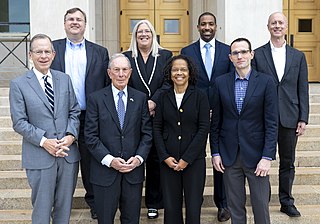
Eric Emerson Schmidt is an American businessman and former software engineer who served as the CEO of Google from 2001 to 2011 and the company's executive chairman from 2011 to 2015. He also served as the executive chairman of parent company Alphabet Inc. from 2015 to 2017, and Technical Advisor at Alphabet from 2017 to 2020. In April 2022, the Bloomberg Billionaires Index estimated his net worth to be US$25.1 billion.

Synopsys, Inc. is an American electronic design automation (EDA) company headquartered in Sunnyvale, California, that focuses on silicon design and verification, silicon intellectual property and software security and quality. Synopsys supplies tools and services to the semiconductor design and manufacturing industry. Products include tools for logic synthesis and physical design of integrated circuits, simulators for development, and debugging environments that assist in the design of the logic for chips and computer systems. As of 2023, the company is a component of both the Nasdaq-100 and S&P 500 indices.
In-Q-Tel (IQT), formerly Peleus and In-Q-It, is an American not-for-profit venture capital firm based in Arlington, Virginia. It invests in companies to keep the Central Intelligence Agency, and other intelligence agencies, equipped with the latest in information technology in support of United States intelligence capability. The name "In-Q-Tel" is an intentional reference to Q, the fictional inventor who supplies technology to James Bond.

Gilman Louie is an American technology venture capitalist who got his start as a video game designer and then co-founded and ran the CIA venture capital fund In-Q-Tel. With his company Nexa Corporation he designed and developed multiple computer games such as the F-16 Fighting Falcon flight simulator series. His company later merged with Spectrum Holobyte where he was CEO until its acquisition by Hasbro, after which he became Chief Creative Officer and General Manager of its Games.com group. He has served on a number of boards of directors, including Wizards of the Coast, Niantic, Total Entertainment Network, FASA Interactive, Wickr, Aerospike, the Chinese American International School, Markle Foundation, and Digital Promise. He is chairman of the Federation of American Scientists and Vricon. He is a member of the President’s Intelligence Advisory Board and the U.S. Department of State’s Foreign Affairs Policy Board.
The ethics of artificial intelligence is the branch of the ethics of technology specific to artificially intelligent systems. It is sometimes divided into a concern with the moral behavior of humans as they design, make, use and treat artificially intelligent systems, and a concern with the behavior of machines, in machine ethics.

Robert Orton Work is an American national security professional who served as the 32nd United States Deputy Secretary of Defense for both the Obama and Trump administrations from 2014 to 2017. Prior to that, Work was the United States Under Secretary of the Navy from 2009 to 2013, and before that served as a colonel in the United States Marine Corps; Work retired in 2001 and worked as a civilian at the Center for Strategic and Budgetary Assessments (CSBA) and the George Washington University in various positions relating to military and strategic study. From 2013 to 2014, he was the CEO of the Center for a New American Security (CNAS). After his time as Deputy Secretary of Defense, he went on to serve on the board of Raytheon. As of October 2023, he serves on the Special Competitive Studies Project's board of advisors.
Palantir Technologies is a public American company that specializes in big data analytics. Headquartered in Denver, Colorado, it was founded by Peter Thiel, Nathan Gettings, Joe Lonsdale, Stephen Cohen, and Alex Karp in 2003. The company's name is derived from The Lord of the Rings where the magical palantíri were "seeing-stones," described as indestructible balls of crystal used for communication and to see events in other parts of the world.

Mustafa Suleyman is a British artificial intelligence (AI) researcher and entrepreneur. Suleyman was the co-founder and former head of applied AI at DeepMind, an AI company acquired by Google. After leaving DeepMind, he co-founded Inflection AI, a machine learning and generative AI company, in 2022.

The Defense Innovation Board is an independent advisory board set up in 2016 to bring the technological innovation and best practice of Silicon Valley to the U.S. Military. It is governed by the Federal Advisory Committee Act (FACA) and provides independent recommendations to the Secretary of Defense. The board consists of experts from across commercial sector, research, and academia.
A military artificial intelligence arms race is an arms race between two or more states to develop and deploy lethal autonomous weapons systems (LAWS). Since the mid-2010s, many analysts have noted the emergence of such an arms race between global superpowers for better military AI, driven by increasing geopolitical and military tensions. An AI arms race is sometimes placed in the context of an AI Cold War between the US and China.
The artificial intelligence (AI) industry in China is a rapidly developing multi-billion dollar industry. As of 2021, the artificial intelligence market is worth about RMB 150 billion, and is projected to reach RMB 400 billion by 2025. The roots of China's AI development started in the late 1970s following economic reforms emphasizing science and technology as the country's primary productive force.

Meredith Whittaker is the president of the Signal Foundation and serves on their board of directors. She was formerly the Minderoo Research Professor at New York University (NYU), and the co-founder and faculty director of the AI Now Institute. She also served as a senior advisor on AI to Chair Lina Khan at the Federal Trade Commission. Whittaker was employed at Google for 13 years, where she founded Google's Open Research group and co-founded the M-Lab. In 2018, she was a core organizer of the Google Walkouts and resigned from the company in July 2019.

Terah Lyons is known for her expertise in the field of artificial intelligence and technology policy. Lyons was the executive director of the Partnership on AI and was a policy advisor to the United States Chief Technology Officer Megan Smith in President Barack Obama's Office of Science and Technology Policy.
Regulation of algorithms, or algorithmic regulation, is the creation of laws, rules and public sector policies for promotion and regulation of algorithms, particularly in artificial intelligence and machine learning. For the subset of AI algorithms, the term regulation of artificial intelligence is used. The regulatory and policy landscape for artificial intelligence (AI) is an emerging issue in jurisdictions globally, including in the European Union. Regulation of AI is considered necessary to both encourage AI and manage associated risks, but challenging. Another emerging topic is the regulation of blockchain algorithms and is mentioned along with regulation of AI algorithms. Many countries have enacted regulations of high frequency trades, which is shifting due to technological progress into the realm of AI algorithms.
The regulation of artificial intelligence is the development of public sector policies and laws for promoting and regulating artificial intelligence (AI); it is therefore related to the broader regulation of algorithms. The regulatory and policy landscape for AI is an emerging issue in jurisdictions globally, including in the European Union and in supra-national bodies like the IEEE, OECD and others. Since 2016, a wave of AI ethics guidelines have been published in order to maintain social control over the technology. Regulation is considered necessary to both encourage AI and manage associated risks. In addition to regulation, AI-deploying organizations need to play a central role in creating and deploying trustworthy AI in line with the principles of trustworthy AI, and take accountability to mitigate the risks. Regulation of AI through mechanisms such as review boards can also be seen as social means to approach the AI control problem.

Group 42 Holding Ltd, operating under the business as G42, is an AI development holding company based in Abu Dhabi, UAE, founded in 2018. The organization is focused on AI development across various industries including government, healthcare, finance, oil and gas, aviation, and hospitality. Tahnoun bin Zayed Al Nahyan, UAEs national security advisor is the controlling shareholder and chairs the company. Because G42 has strong ties to China U.S. authorities have been concerned that G42 serves as a channel through which sophisticated U.S. technology is diverted to Chinese companies or the government.

James M. Manyika is a Zimbabwean-American academic, consultant, and business executive. He is known for his research and scholarship into the intersection of technology and the economy, including artificial intelligence, robotics automation, and the future of work. He is Google's first Senior Vice President of Technology and Society, reporting directly to Google CEO Sundar Pichai. He focuses on "shaping and sharing" the company's view on the way tech affects society, the economy, and the planet. In April 2023, his role was expanded to Senior Vice President for Research, Technology & Society and includes overseeing Google Research and Google Labs and focusing more broadly on helping advance Google’s most ambitious innovations in AI, Computing and Science responsibly. He is also Chairman Emeritus of the McKinsey Global Institute.

The Artificial Intelligence Cold War is a narrative in which tensions between the United States of America and the People's Republic of China lead to a second Cold War waged in the area of artificial intelligence technology rather than in the areas of nuclear capabilities or ideology. The context of the AI Cold War narrative is the AI arms race, which involves a build-up of military capabilities using AI technology by the US and China and the usage of increasingly advanced semiconductors which power those capabilities.
The National Security Commission on Emerging Biotechnology (NSCEB) is an American bipartisan legislative commission created by Congress in the National Defense Authorization Act for Fiscal Year 2022.
The Special Competitive Studies Project (SCSP) is a non-partisan U.S. think tank and private foundation focused on technology and security. Founded by former Google CEO Eric Schmidt in October 2021, SCSP's stated mission is to "make recommendations to strengthen America’s long-term competitiveness as artificial intelligence (AI) and other emerging technologies are reshaping our national security, economy, and society." It seeks to ensure that "America is positioned and organized to win the techno-economic competition between now and 2030."












